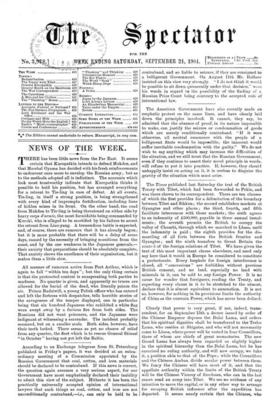The Times published last Saturday the text of the British
Treaty with Tibet, which had been forwarded to Pekin, and was there shown to its correspondent. There are ten clauses of which the first provides for a delimitation of the boundary between Tibet and Sikkim ; the second establishes markets at Gyangtse and other places ; the third, fourth, and fifth facilitate intercourse with those markets ; the sixth agrees to an indemnity of £500,000, payable in three annual instal- ments; the seventh permits the British to occupy the valley of Chumbi, through which we marched to Lhasa, until the indemnity is paid ; the eighth provides for the dis- mantling of all forts between the British frontier and Gyangtse ; and the ninth transfers to Great Britain the control of the foreign relations of Tibet. We have given the text of this most important clause elsewhere, and need only say here that it would in Europe be considered to constitute a protectorate. Every loophole for foreign interference is closed, all " concessions " are forbidden without previous British consent, and no land, especially no land with minerals in it, can be sold to any foreign Power. It is no cause for wonder that foreigners, reading the Treaty, and expecting every clause in it to be stretched to the utmost, declare that it is almost equivalent to annexation. It is not so, however, for nothing in its provisions limits the authority of China as the suzerain Power, which has never been defined.






































